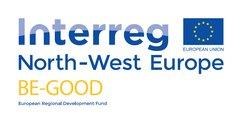Digitale Data: BE-GOOD – Project Interreg North West Europe
Digitale data gaan een steeds belangrijkere rol spelen binnen de kenniseconomie, nu en in de toekomst. Met dit idee is het Interreg North West Europe project BE-GOOD (Building a Ecosystem to Genarate Opportunities in Open Data) ontwikkeld. Met dit project probeert men waarde te creëren uit duurzame ecosystemen en deze te stimuleren. Dit gebeurt voor open data in regio's in Noordwest-Europa.
 Internationaal project
Internationaal project
Naast partijen uit België, Luxemburg, Frankrijk, Verenigd Koninkrijk en Ierland is in Nederland o.a. het Hoogheemraadschap van Delfland verbonden aan dit project.
Overheidsinformatie hergebruiken
Doel van dit project is om overheidsinformatie (Public Sector Information of PSI) te (her)gebruiken en te valoriseren door innovatieve, door data gedreven diensten te ontwikkelen op het gebied van infrastructuur en milieu. BE-GOOD zal uiteindelijk een aantal operationele prototypen van nieuwe commerciële PSI-gebaseerde diensten moeten opleveren.
Huishoudelijk afvalwater
In Nederland werken verschillende overheidsinstanties (gemeenten en regionale waterschappen) samen aan het verzamelen, vervoeren en behandelen van huishoudelijk afvalwater. Toch mist er nog iets. Er is nog geen goed functionerend ecosysteem voor het efficiënt delen van openbare gegevens en informatie. Deze informatie zou het beheer van de afvalwaterinfrastructuur tussen de verschillende partners kunnen verbeteren. Dit is belangrijk om te zorgen voor kennis en inzicht over de werking van de afvalwaterinfrastructuur.
Demo van een ecosysteem
Het belangrijkste doel dat het Hoogheemraadschap wil bereiken met deelname aan dit project, is het maken van een “prototype” (demo). Dit prototype is een demo van een ecosysteem dat de oorspronkelijke afvalwatergegevens van gemeenten en het hoogheemraadschap vindt en combineert. Die gegevens kunnen dan worden verwerkt en geanalyseerd, waardoor ze uiteindelijk iets opleveren voor de gebruikers van het water.
Verschillende meetsystemen
De verschillende partijen binnen de afvalwaterketen hebben allemaal weer behoefte aan andere informatie. Ze meten op verschillende manieren en gebruiken daarvoor verschillende meetsystemen. Om gezamenlijk analyses te kunnen maken, zou het handig zijn om (ruwe) data centraal te verzamelen en op te slaan. Dit kan door het ontwikkelen van een dataplatform. Het Hoogheemraadschap werkt nu voor BE-GOOD nauw samen met de gemeente Vlaardingen in het ontwikkelen van een uitwisselingsplatform.
Voor meer informatie over het dataplatform kun je contact opnemen met Chahid Lhajoui. Je kunt hem bereiken via het volgende mailadres: [email protected].
De tekst hieronder is Engelse vertaling van bovenstaand artikel.
International project
Data is a major asset of the EU knowledge economy. In this context, the Interreg VB NWE project BE-GOOD (Building an Ecosystem to Generate Opportunities in Open Data) has been developed to generate value from and stimulate sustainable ecosystems for open data in regions in North–West Europe. BE-GOOD is a pioneering project aiming to unlock, re-use and extract value from Public Sector Information (PSI) to develop data-driven services in the area of infrastructure and environment.
BE-GOOD delivered 11 new data-centred services to extract commercial value from PSI. The project used a novel demand-driven approach. By unlocking datasets and better engaging with the marketplace, the development of applications, software or algorithms was made possible. The services that have been developed are based on business cases that enable market uptake for Small and Medium Enterprises (SMEs) and job creation. The invested money has improved citizen interaction and created new digital public services that allow for greater productivity and efficiencies.
Re-using data
The main goal that the Hoogheemraadschap van Delfland had in mind to participate in this project was to create a “prototype” (demo) of an ecosystem that finds and combines the original waste water data from municipalities and the water authority so that it can be processed and analyzed to provide functionalities. for end users.
Due to climate change, many European countries now expect to face more frequent periods of heavy rain or drought. Nowadays, in the Netherlands, most cities still collect waste water and stormwater in one combined wastewater system. When more rain falls than can be stored in the sewer system, the sewer system may occasionally overflow. The diluted sewage water could then leak into the surface water, thus polluting it. This may lead to environmental issues, like fish mortality, pollution of the sludge and eventually diseases in the cattle who drink the surface water. Besides these environmental issues, public health can be at risk due to the pollution of recreational waters.
Insights into water quality and quantity
Hoogheemraadschap van Delfland would like to have more insight into the water quality and quantity, as well as the potential impact of its sewer systems on the surface water.
Water management involves many different partners and therefore many different sources of data. To combine the wastewater data and information of individual partners like Delfland, a platform was developed by the company HydroLogic to optimise (waste) water management. The platform incorporates both static and dynamic data to gain more insight into the water infrastructure and its bottlenecks, but also in the way the complex systems work together and how they influence each other. In this way, it will be more clear which measurements can be taken to improve the system and potentially prevent future water damage.
For more information about BE-GOOD: www.nweurope.eu/begood
For more information about the data platform please contact: Chahid Lhajoui, [email protected].